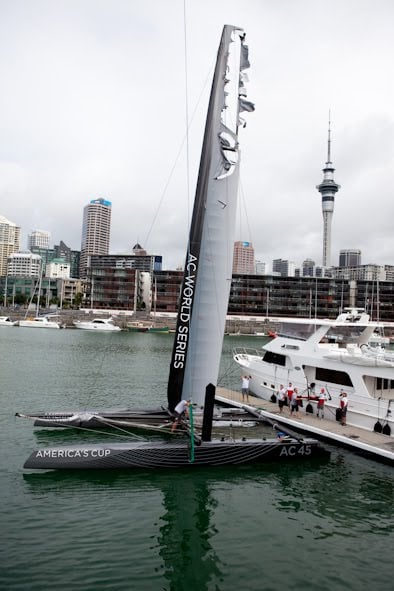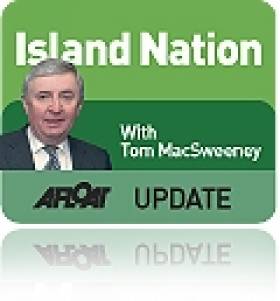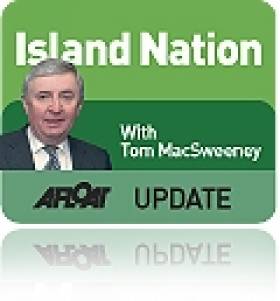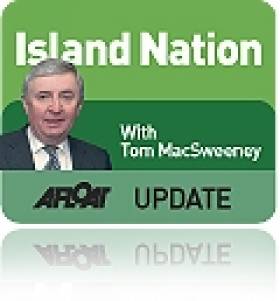Displaying items by tag: Fianna Fail
Fianna Fáil Leader Says No Deal Brexit Live Possibility
Fianna Fáil leader Micheál Martin has said a no deal Brexit is now a live possibility and his party would honour its promise to continue with the Confidence and Supply Agreement to provide stability.
However Mr Martin speaking on RTE News commented that the Government's plans to deal with a hard Brexit are not adequate.
He said that mayhem would ensue at Dublin Port if there was a no deal Brexit because the port is not ready.
Mr Martin said Government continue to "huff and puff" and insist they are ready but they are not.
He added that if there is a disorderly Brexit, it is important to have all hands on deck to ensure that people's jobs are protected.
For more on yesterday's RTE report, click here for link for footage of the FF leader.
Afloat adds also yesterday the Dublin Port Company published their second quarter (pdf) Trade Statistics for 2019.
For the most up to date figures on imports, exports, tourism and more click here in addition to read the report in full.
Noting other quarterly figures are available to download dating back to Q1 of 2015.
Will Election Promises Be Delivered On?
Fine Gael can, logically from the support which the party garnered in the General Election, be expected to dominate a Coalition Government. In that context, the question arises as to whether they will deliver on their pre-election manifesto commitment to re-establish the Department of the Marine?
The promise to do so was unequivocal, a clear undertaking that the situation created by the former Fianna Fail and Green Party Coalition which had decimated maritime issues by spreading them over several Departments of State, would be changed and all would be contained in one Department.
In the event of a Coalition being formed will we hear that "circumstances" have changed and adjustments must be made in the context of Coalition arrangements?
I had the opportunity to question Joan Burton of the Labour Party, one of the party negotiators, prior to the election at an event organised by the European Association of Journalists. She accepted that politicians had not paid enough attention to the marine sphere and said that this attitude should be changed and accepted that the nation could benefit economically as a result.
I hope that I am not being overly cynical towards politicians, born of long years of journalistic experience, in fearing that pre-election promises may be subjected to change.
• This article is reprinted by permission of the EVENING ECHO newspaper, Cork, where Tom MacSweeney writes maritime columns twice weekly. Evening Echo website: www.eecho.ieMarine Department Promised, First America's Cup Capsize, Whales and Sailing Oil Tankers
I am reflecting this week on a varied list of maritime issues which have arisen in my writings on marine topics.
Following recent pieces I wrote about the attitude of political parties in the General Election towards the marine sector, I had a telephone call from a senior Fine Gael politician and, lo and behold, the party included the marine sector in its manifesto, pledging to restore the Department of the Marine, abolished by Fianna Fail. I await post-election developments with interest.
It has been a good week for those interested in protection of whales and dolphins. Hundreds of dolphins were spotted off the Old Head of Kinsale, apparently following shoals of herring and sprat on which they were feeding.
In the Antarctic the Japanese whaling fleet was forced to give in to pressure to stop culling. The Japanese have killed hundreds of whales every year, claiming this was for "scientific purposes," even though it has been identified worldwide as for human consumption. The fleet was ordered home by its Government after increasing international pressure.
The Irish Whale and Dolphin Group published its annual report this week. It was formed in December 1990, dedicated to the "conservation and better understanding" of cetaceans - whales, dolphins and porpoise - in Irish waters through "study, education and interpretation." IWDG turnover in 2010 was around €300,000. It has dealt with up to 10,000 queries a month for information on its website. A total of 92 strandings of 128 individual cetaceans was reported to the IWDG in 2010. This compares to 137 strandings of 169 animals for 2009.
This week oil prices rose because of the unrest in Libya and David Surplus, Chairman of B9 Energy Britain's largest windfarm operator, warned that sooner or later oil will run out. BP is examining the possibility of building a fleet of carbon-neutral, wind-powered sail ships planned, to carry world trade.
On the international sailing scene the new AC 45, forerunner of the next generation of America's Cup boats was launched in New Zealand and had its first capsize. The wing-sailed catamaran is designed for speed and close racing, capable of making up to 30 knots, while intended to be handled in tight, tactical courses. An exciting boat to sail, it will also be very testing of ability. The first capsize of the new boat occurred on Auckland's Hauraki Gulf, hit by what was described as "a freak gust of wind," while the crew were doing maintenance on board before a sailing test.

Back in dock after the capsize
It capsized fully, ending upside down. Three support vessels were needed to pick up the crew and right the boat which was sailed back to its base in Auckland. There was damage to the wing sail, but no injuries to the crew. However, helmets may be an additional precaution needed for sailing these boats, which are to be used in the AC World Series! This will be a circuit of eight regattas for which venue bids are being made at present, with fleet and match racing, to raise the profile of high-performance sailing on worldwide television. Racing is to start in July, with regattas running until May of next year, leading into preparations for the next full AC series in the bigger AC72 catamarans in 2013 in San Francisco.
As the past week showed, there is always something interesting in the sea.
This article is reprinted by permission of the EVENING ECHO newspaper, Cork, where Tom MacSweeney writes maritime columns twice weekly. Evening Echo website: www.eecho.ie
Now There is None
What a magnificent sight it was as the three Tall Ships, each flying the Tricolour, headed the fleet of the gracious ships of sail from all over the world.
How different it will be in July when the world's Tall Ships again parade down the Suir. There will be no Irish national sailing ship to lead the parade. A number of private Irish entries are expected at Waterford from June 30–July 3 amongst the 70 vessels from around the world when the city has the honour starting the race. In 2005 about half-a-million people visited the city while the Tall Ships were there.
The lack of a national tall ship is another example of governmental maritime neglect, directly due to the decision of former Defence Minister Willie O'Dea, T.D. After the sinking of ASGARD he publicly committed the Government to its replacement, but after receiving insurance compensation money for its loss, he put the money into coffers of the Department of Finance and closed down the national sail training programme. There was a big difference between what he promised and what he did, a disregard for the maritime sphere which it is hard to forgive. I also recall how former Taoiseach Bertie Ahern did not visit Waterford during the 2005 race, when it was the biggest tourist event in the country. When I broadcast my report expressing astonishment at this snub government sources and Fianna Fail didn't like it. Truth in the news can be painful!
The organisers made contacts about the DUNBRODY, which continues to earn income at the New Ross quayside where it is moored as a tourist attraction and with the JEANIE JOHNSTON, moored at the Dublin Docklands.
However, neither will be taking part, the organisers have confirmed, tough they said that it was expected that about 100 young Irish trainees would sail aboard tall ships in the race, half of them with funding support from local authority, business and other sources. A group of Irish sailors have also indicated they are making arrangements to charter a UK-registered vessel the JOHANNA LUCRETIA for the event.
Once again the Irish Government has sunk to the bottom where maritime matters are concerned.
It was announced this week in Waterford that Fáilte Ireland has made a significant financial and marketing commitment to this year's event, though the financial figure was not disclosed .A free festival programme will feature street acts; comedy; international and home-grown artists, nightly fireworks, an artisan food village and an atmosphere which the organisers say "will thrill people of all ages and nationalities."
• This article is reprinted by permission of the EVENING ECHO newspaper, Cork, where Tom MacSweeney writes maritime columns twice weekly. Evening Echo website: www.eecho.ie
Labour Manifesto Leads the Way on Irish Maritime Affairs
Fine Gael has told Afloat.ie details of its marine policy will be published in its manifesto tomorrow. If that's the case things are looking up for anyone interested in seeing Ireland develop the valuable waters that surround it.
After searching for references to 'sea', 'marine' or 'maritime' only the Labour party has so far made the only significant written commitment to the marine sector in its programme for government. Its manifesto acknowledges that Coastal Communities, Fisheries and the Marine face major challenges in the years ahead, but it is also an area of major economic potential.
Fianna Fail merely says on page 21 of its manifesto that it will ensure that 'an inter-departmental strategy is in place to improve the leisure potential of our harbours and increase marine tourism'.
The Green Party 'Renewing Ireland' document says it will promote the creation of marinas and youth and child friendly water sports to encourage activity and awareness of our maritime country. It also says Ireland will participates in the North Seas Offshore Grid Plan.
There is no reference to the marine in the Sinn Fein 'There is a Better Way' manifesto.
Four party manifestos are available to download below.
Labour's priority will be to develop Ireland as a European hub for seafood processing, which will create sustainable, value-added jobs in coastal communities.
Labour will also develop an Irish seafood strategy to grow the market profile and demand for Irish seafood products. We will support the development of sustainable aquaculture and fish farms by streamlining the licensing process and reducing, as much as possible, the associated bureaucracy. To further assist the development of the sector, responsibility for maritime policy will, as far as is practicable, be concentrated in one department.
Labour will establish a Sea Fisheries Sustainability Impact Assessment based on consultation with all major stakeholders. This report will be brought before the Dáil on an annual basis before EU fisheries negotiations commence, and will ensure that there is a regular evaluation of Irish fish stocks and the effectiveness of current policy and quotas.
Labour is open to the experience and expertise of those whose livelihoods depend on maritime activity. The Department of Agriculture, Fisheries and Food will engage in an ongoing structured consultation with industry representatives, the marine scientific community and other stakeholders to enable them to contribute to national maritime policy.
Finally, safety at sea and decent working conditions must underpin the development of the fisheries sector. Labour in government will ensure that the Irish Coast Guard has access to an Emergency Towing Vessel.
Dun Laoghaire People before Profit candidate Richard Boyd Barrett who has campaigned under a 'Save our Seafront' banner in the last council elections, is holding a meeting tomorrow night in Dun Laoghaire, the country's largest boating centre to protest against the possible 'privatisation' of the town's harbour.
We're tracking the progress of maritime affairs in the general election and posting details on afloat.ie. Whether you're a candidate or a vote please get in touch with your #ge11 marine news. Contact us via facebook, twitter or our website.

































































